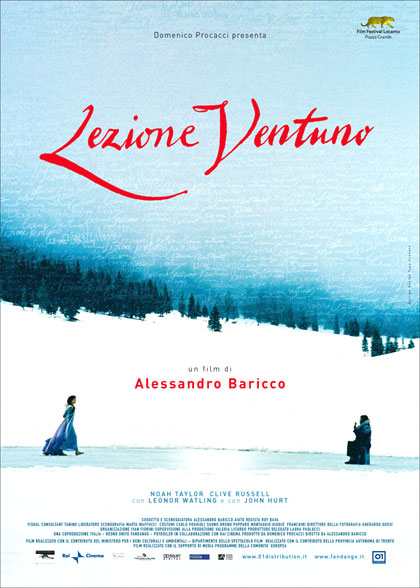
Il soggetto di questo film, uscito in Gran Bretagna lo scorso giugno e ancora inedito in Italia, è di per sé abbastanza irrilevante: tratto da una storia vera, il film tratta dell'insolito rapporto tra Caitlin MacNamara (Sienna Miller), moglie del poeta gallese Dylan Thomas (Matthew Rhys), e il primo amore dello stesso, Vera Phillips (Keira Knightley), nonché dei drammatici intrecci che ebbero luogo all'interno di questo menage à trois.
A dire il vero, il film, che nella prima parte si barcamena faticosamente e confusamente per mostrare la spensieratezza del rapporto a tre, diventa interessante quando rientra in scena in modo preponderante il marito di Vera, William Killick (Cillian Murphy), soldato dell'esercito britannico rientrato dal secondo conflitto mondiale dopo aver combattuto sul fronte greco: la storia si carica di una forza drammatica concreta, esplorando la tragedia di un uomo che non riesce ad abituarsi alla normalità e tantomeno alle circostanze del tutto particolari in cui vive la moglie, a sua volta piegata dalla frustrazione di non riuscire a spezzare il muro di incomunicabilità che la allontana progressivamente dal suo amato sposo.
La fine preannunciata dell'incantesimo di apparente pacificità del menage si traduce in un ripiegamento delle coppie su se stesse ed in una conseguente esplosione di tutte le inquietudini fino a quel momento ignorate: in tutto ciò l'unica costante sembra essere la profonda amicizia tra le due donne, entrambe vittime dell' amore, in trappola ed alla ricerca di uno sfogo, l'una in scappatelle extra-matrimoniali, l'altra nella maternità.
L'ambientazione del film dona molto alla storia e passa da una Londra buia ed assediata alle coste plumbee e brulle del Galles: il grigio, il verde ed il marrone sono i colori predominanti, creando un'atmosfera di latente perdizione all'interno della quale i personaggi sembrano sprofondare ciecamente.
Gli attori sono tutti in stato di grazia, donando ai rispettivi personaggi una corporeità genuina e rendendone alla perfezione lo stato di "vinti", chi dal proprio ego, chi dalla storia, chi dalla debolezza, chi dall'onestà.
Il finale, che mi guardo bene dal rivelare, pone agli spettatori una domanda: si può essere vinti per colpa dell'amore, costretti ad espiarne i torti ed infine permettere che sia il medesimo amore a risollevarci?
Non sta a me rispondere, a maggior ragione perché in questo film ci sono diverse sfumature di amore e la soluzione alla precedente domanda presuppone l'aver individuato quale sia la natura dell'amore che pone in essere un meccanismo simile, non univoca per i personaggi.
In chiusura, consiglio agli amanti delle lingue di scoprire i numerosi significati del termine "edge", che mi rifiuto di tradurre, in quanto, a seconda della traduzione accolta, il titolo acquista ombrature assai diverse tra loro eppure tutte presenti nella storia.
The Edge of Love
When you think of a "menage à trois", this film is certainly not the first to come in mind: the story itself, revolving around the close friendship between Caitlin MacNamara (Sienna Miller) and Vera Phillips (Keira Knightley), respectively wife and former (?) lover of Welsh poet Dylan Thomas (Matthew Rhys), however true, is irrelevant when taking into consideration the strong points of this film.
The film acquires pace and intensity only halfway through, when Vera's husband, William Killick (Cillian Murphy), returns after having fought in World War II and has to come to terms with the horrible trauma he suffered while feeling that no one around him is capable of understanding such pain.
Consequently, Vera is devastated by the radical change her husband has undergone and becomes obsessed with his recovery, whilst burying her frustration by being a model mother; on the other hand, Caitlin's dissatisfaction resolves in more and more frequent extra-marital affairs and Dylan dives deeper into his art, forgetting about everything else.
By a cruel joke of fate, the only genuinely normal relationship seems to be the one between the two women, falling together in the abyss of incommunicability which separates them from their respective husbands.
The actors are all at their best, perfectly conveying the sense of irreparable defeat which drives the characters to such extreme behaviours, and it's not merely coincidental that the predominant colors of the various settings are grey, brown and a dull green, as if to point out the road to perdition the characters are treading along.
The finale, which of course I won't reveal, brings forward a question: Can we allow the very same love that made us atone for its sins to lift us back up on our feet? What is the nature of this love?
I don't presume to reply, nor shall I dwell on the significance of the word "edge", which can assume a variety of shades, all present, depending upon the undertone one chooses to attribute to it.
